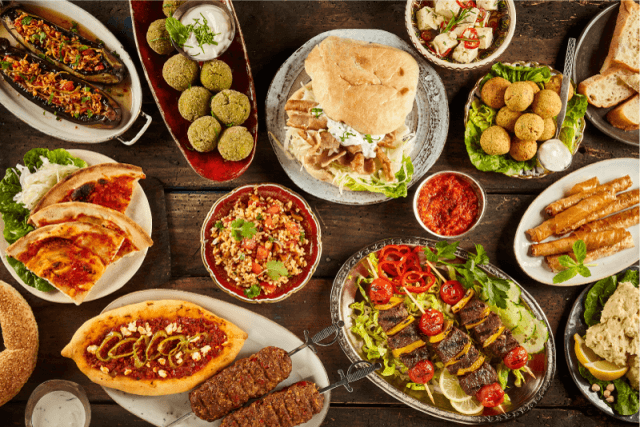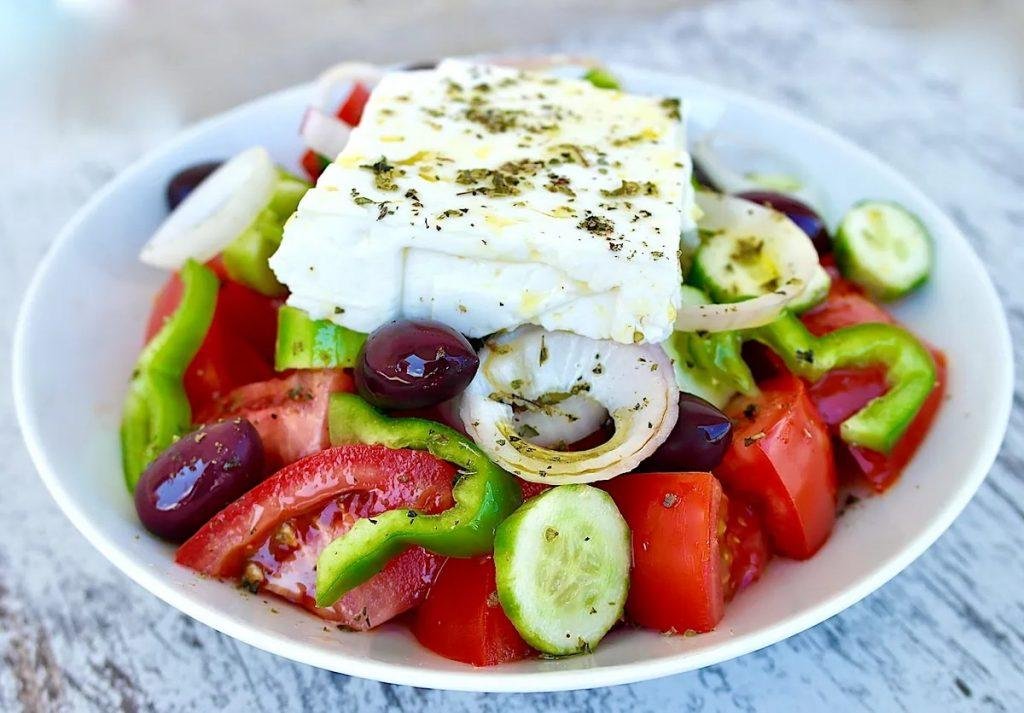Exploring The Top 10 Mediterranean Foods For Your Diet
The Mediterranean region has long been celebrated for its rich and diverse culinary heritage. From the sunny shores of Spain to the enchanting Greek islands, Mediterranean cuisine has captured the hearts and taste buds of food enthusiasts worldwide. Not only is Mediterranean food delicious, but it also offers a wide array of health benefits.

The Mediterranean Diet
As we’ve explored these delectable Mediterranean dishes, it’s essential to touch on the Mediterranean diet itself. This eating pattern is renowned for its health benefits, including reduced risk of heart disease, improved weight management, and longevity. It emphasizes the consumption of whole grains, fresh fruits and vegetables, lean proteins (like fish and poultry), nuts, seeds, and healthy fats, primarily from olive oil.
The Mediterranean diet is not just about what you eat; it’s also about how you eat. Meals are savored slowly, often shared with family and friends, and accompanied by a glass of red wine in moderation. This approach to dining fosters a sense of community and promotes mindful eating.
High-Protein Vegetarian Mediterranean Diet
For those who prefer a vegetarian or plant-based lifestyle, the Mediterranean diet offers ample opportunities. Many of the dishes we’ve discussed, such as Greek salad, hummus, and falafel, are excellent sources of plant-based protein. Nuts, seeds, legumes, and dairy products are also key components of a high-protein vegetarian Mediterranean diet. By incorporating these protein-rich foods into your meals, you can enjoy the health benefits of the Mediterranean diet while adhering to your dietary preferences.
In this article, we’ll delve into the world of Mediterranean food, exploring its recipes, diet, and some of the most mouthwatering dishes you can Savor on your culinary journey.
Mediterranean Food Greek Salad

We begin our Mediterranean food exploration with a classic favorite – the Greek salad. Comprising fresh cucumbers, ripe tomatoes, red onions, olives, and feta cheese, this dish is a delightful medley of flavors and textures. Drizzle some extra virgin olive oil and sprinkle oregano to bring it to life. This healthy Mediterranean food is a staple, often served as a side or light meal.
Hummus
Hummus is a beloved Middle Eastern dip made from chickpeas, tahini, lemon juice, garlic, and olive oil. Its creamy consistency and earthy taste make it a favorite among Mediterranean food enthusiasts. Served with pita bread or fresh vegetables, hummus is a nutritious and satisfying snack or appetizer.
Mediterranean Food Paella

Paella is a Spanish delicacy that showcases the robust flavors of the Mediterranean. This rice dish is usually prepared with saffron, vegetables, and a choice of seafood, chicken, or rabbit. The key to a perfect paella is the socarrat, a crispy layer of rice at the bottom of the pan. It’s a quintessential Mediterranean food recipe that promises a burst of flavors in every bite.
Tzatziki
Tzatziki, a Greek yogurt and cucumber sauce, adds a refreshing touch to many Mediterranean dishes. It’s often served alongside grilled meats, gyros, or as a dip for pita bread. The combination of yogurt, cucumbers, garlic, and dill creates a harmonious blend that perfectly complements the bold flavors of Mediterranean food.
Couscous

Couscous, a staple of North African and Mediterranean cuisine, is a versatile grain that’s both quick to prepare and incredibly adaptable. It serves as an ideal base for a wide range of Mediterranean food recipes. From Mediterranean-style vegetable and chickpea stews to flavorful couscous salads, this grain is a must-try for those exploring the Mediterranean diet.
Ratatouille
Originating from Provence, France, Ratatouille is a vegetable medley that exemplifies the essence of the Mediterranean diet. This hearty dish combines tomatoes, eggplant, zucchini, bell peppers, and various herbs. Slow-cooked to perfection, Ratatouille can be served as a side dish or enjoyed as a main course with a crusty baguette.
Mediterranean Food Tabbouleh

Tabbouleh is a classic typical Mediterranean meal salad hailing from Lebanon. This vibrant dish features finely chopped parsley, tomatoes, onions, mint, and bulgur wheat, all tossed together with a zesty dressing of lemon juice and olive oil. It’s a refreshing, healthy Mediterranean food that’s perfect for a light lunch or as a side dish for grilled meats.
Moussaka
Moussaka, often considered Greece’s answer to lasagna, is a layered casserole dish that combines minced meat (typically beef or lamb) with eggplants and potatoes. It’s generously spiced with cinnamon and nutmeg, topped with a creamy béchamel sauce, and baked to golden perfection. This hearty protein vegetarian mediterranean diet is comfort food is a beloved favorite for special occasions.
Falafel

Falafel, crispy deep-fried balls made from ground chickpeas or fava beans, is a staple in many Mediterranean cuisines. Served in pita bread with tahini sauce and fresh veggies, or on a plate with various sides, falafel is a high-protein vegetarian Mediterranean diet option that satisfies both meat lovers and vegetarians alike.
Spanish Gazpacho
To conclude our culinary tour of Mediterranean food, we head to Spain for a refreshing bowl of Gazpacho. This chilled tomato-based soup is a perfect choice for hot summer days. It’s made with ripe tomatoes, bell peppers, onions, cucumber, garlic, and a splash of olive oil and vinegar. Gazpacho is a healthy and vibrant addition to any typical Mediterranean meal.
Conclusion – In the world of culinary delights, Mediterranean food holds a special place, offering a tantalizing fusion of flavors, textures, and aromas. From the Greek Isles to the shores of Spain, the Mediterranean region’s diverse dishes are a testament to its rich cultural heritage and commitment to a healthy way of eating.
The Mediterranean diet, with its emphasis on fresh, whole foods and heart-healthy fats, has not only captured the attention of food enthusiasts worldwide but also garnered recognition from health experts for its numerous health benefits. Whether you’re enjoying a typical Mediterranean meal by the sea or preparing one in the comfort of your own kitchen, the Mediterranean culinary experience is a journey that promises both gastronomic pleasure and wellness.
So, embrace the Mediterranean way of eating, try out these mouthwatering Mediterranean food recipes, and savor the goodness of this timeless and healthy cuisine. Your taste buds and your health will thank you for it.
FAQs
Q: What are the key components of the Mediterranean Diet?
A: The key components include: –
- Fruits and vegetables
- Whole grains
- Olive oil as the primary fat source
- Lean sources of protein (fish, poultry, legumes)
- Nuts and seeds
- Limited red meat consumption
- Moderate consumption of red wine (if desired)
- Herbs and spices for flavouring instead of salt
Q: Is the Mediterranean Diet suitable for vegetarians and vegans?
A: Yes, the Mediterranean Diet is adaptable for vegetarians and vegans. Plant-based sources of protein like legumes, nuts, seeds, and whole grains play a significant role in this diet.
Q: What are the health benefits of the Mediterranean Diet?
A: The Mediterranean Diet has been associated with numerous health benefits, including:
- Reduced risk of heart disease
- Improved weight management
- Lower risk of type 2 diabetes
- Enhanced brain health
- Reduced inflammation
- Better control of blood sugar levels
Q: Can the Mediterranean Diet help with weight loss?
A: Yes, the Mediterranean Diet is often recommended for weight management. Its focus on whole, nutrient-dense foods and healthy fats can support weight loss when combined with portion control.
Q: Is red wine a requirement in the Mediterranean Diet?
A: No, red wine is not a requirement. While moderate consumption of red wine has been associated with certain health benefits, it’s entirely optional. If you don’t drink alcohol, you can still follow the Mediterranean Diet successfully.
Q: How does the Mediterranean Diet compare to other popular diets?
A: The Mediterranean Diet is distinct from many other diets because it prioritizes a wide variety of foods, encourages social dining, and emphasizes the quality of food over strict calorie counting. It’s often viewed as a sustainable, long-term approach to eating.
Q: Are there any foods to avoid on the Mediterranean Diet?
A: While the Mediterranean Diet encourages a balanced and varied intake of foods, it’s advisable to limit or avoid processed foods, sugary beverages, and excessive red meat consumption. High-sodium foods should also be consumed in moderation.
Q: Can children follow the Mediterranean Diet?
A: Yes, the Mediterranean Diet can be adapted for children. It provides a balanced and nutrient-rich approach to eating, which can support the growth and development of children.


